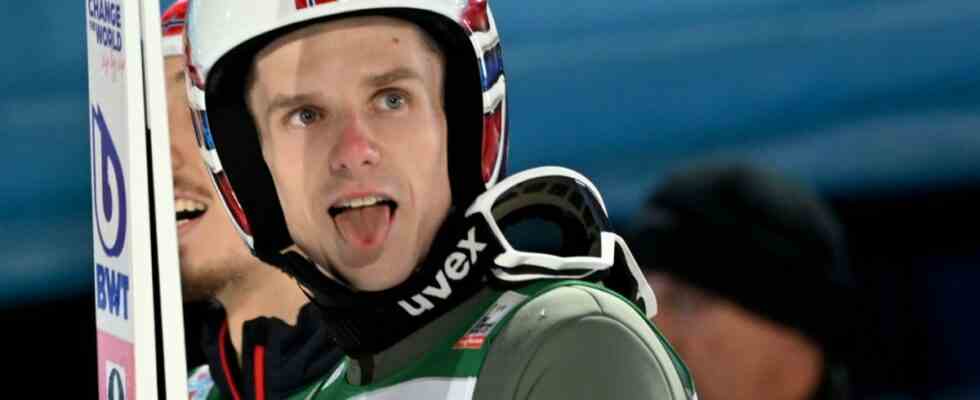They have waited and shown patience, withdrawn and been content with small steps in the development of the form. Material, crouch, jump were adjusted again and again, and now, at the start of the 71st Four Hills Tournament, the team of the German Ski Association can travel on to the next tour station with optimism – because the direction of their tedious development work seems to be right.
Karl Geiger took fourth place in Oberstdorf, it is his best result since his interim low this winter. However, the currently best jumper of the German Ski Association could not keep up with the top jumpers of December: Nevertheless, three of them delivered an exciting competition in the final, a final in which the previous order at the top of the Ski Jumping World Cup was shattered.
The Norwegian Halvor Egner Granerud accepted the winner’s trophy along with the winner’s cheque, but behind him was not the Pole Dawid Kubacki, who was the leader in the World Cup, but his compatriot Piotr Zyla, whose extroverted cheering increased at least as loudly and as much as his surprising performance just before. Geiger cheered more subtly, straining his vocal cords is not his style, he ended up fourth, his teammate Andreas Wellinger was sixth. In between was the Austrian Stefan Kraft, who had recovered well from his illness.
A success at the start is not necessarily decisive for an overall victory, says national coach Stefan Horngacher
So it was an exciting start to the tour, which would have been a little more predictable without another comrade-in-arms. Once again the tailwind, which falls from the Nebelhorn and then sweeps over the Schattenbergschanze from behind, got involved. The jumpers are used to it, they tried not to be influenced by it this time either, which sometimes worked better, sometimes worse. Especially since – as soon as everyone had adjusted to the tailwind, which was very annoying for ski jumpers, the air suddenly pushed up again from below, which is always an advantage, which is why the jury waited a good ten minutes until, for reasons of justice, disgusting jumping weather prevailed again.
The Germans, at least their best, had adapted well to the conditions. And in the end they could also live with the fact that a podium place had just not worked out. Basically, this variant of a not furious entry into the tour series was almost desired.
National coach Stefan Horngacher recently said that the decisive factor for an overall victory is not necessarily a success at the start, but the development up to the last station in Bischofshofen. Because the increase last time from Engelberg through the first training jumps in Oberstdorf to the final, Horngacher’s calculation of staying at the top at least until January 6th is quite realistic. In any case, he was full of praise that evening: “We can be very satisfied with the performance of our athletes, really respect for Karl and Andi Wellinger, who did a great job. With the pressure and the spectators, they solved it very, very well .”
Markus Eisenbichler jumps too short – and is considering exiting early
So there will be no sadness or depression in the German team bus on the way to the next station in Garmisch and Austria. Even though Geiger and Wellinger didn’t manage to finish on the podium, they take their flow with them on the journey: “I’m very happy with the day, I managed really good jumps,” said Geiger. And Granerud jumped at a different level in Oberstdorf, but – “he too has to get through it first.” Andreas Wellinger, who was even ahead of Geiger at first, was amazed at himself: “That was my best result in Oberstdorf,” said the 27-year-old: “I’ll take away that I jumped really well on skis.” The third best German was the young ski jumper Raimund Philipp from Oberstdorf, who came 14th in his first World Cup season and therefore also in his first Four Hills Tournament at the age of 21.
But there are always athletes at the other end of a team who are going through difficult times. Ski jumping harbors irrational phenomena, the form of the jump is one of them, and this winter she met Markus Eisenbichler, once a runner-up in the tour, who has now disappeared without a word in some door of the Schattenberg Arena. As one of the first of the evening, he once again fell short and soon missed out on a place on the lucky loser list. That evening he considered leaving the tour prematurely.

